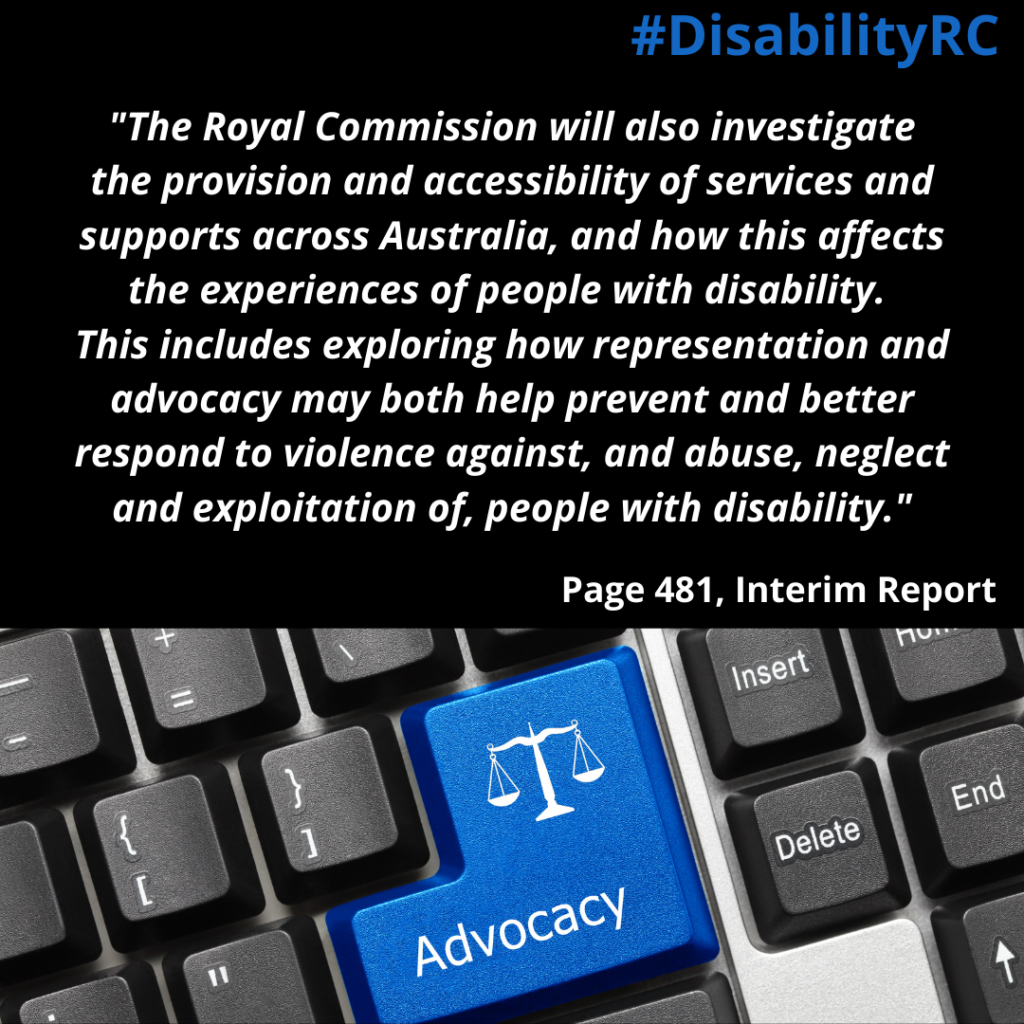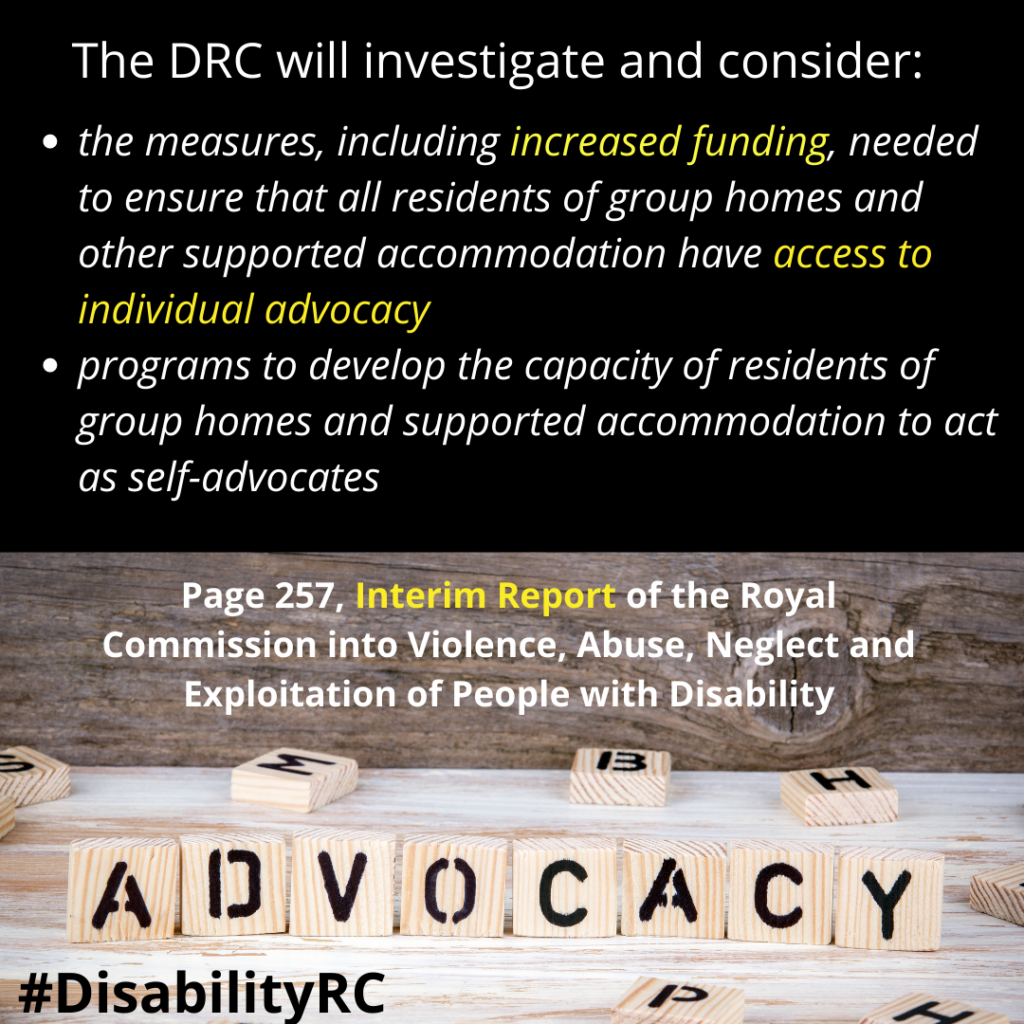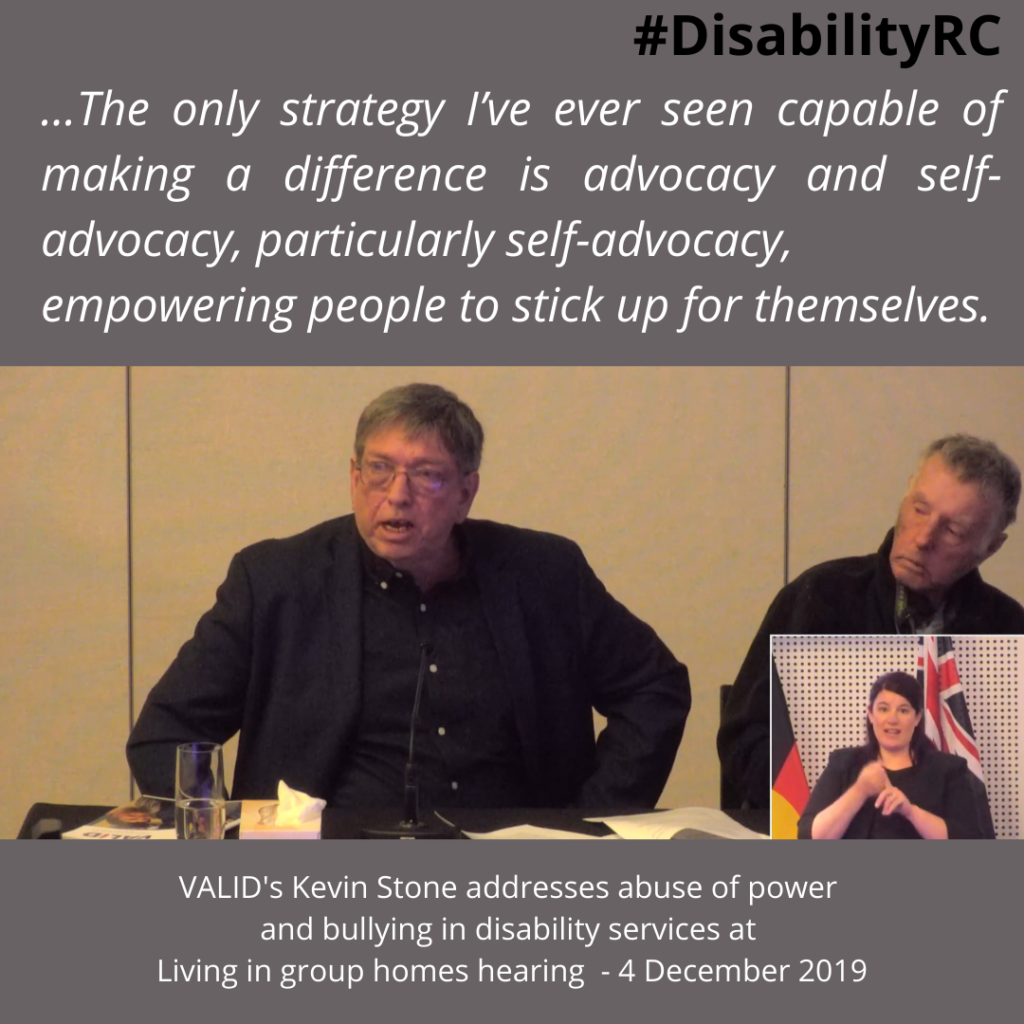The Disability Royal Commission (DRC) has not made recommendations in its Interim Report, released on 30 October 2020. It does however identify various “emerging themes and key issues” and “areas for further inquiry” with some general findings in the areas of health and group homes. The Interim Report credits disability advocates as fundamental to this Royal Commission being established and for the achievement of important reforms in the past:
“Disability advocates and their supporters argued strongly and persistently over many years for a royal commission into violence against, and abuse, neglect and exploitation of, people with disability.” (page 18)
The Interim Report acknowledges and reflects the extremely important role of disability advocates and advocacy organisations in supporting people with disability to heard during the DRC processes. This is also evident in the numerous references to evidence given by advocates at hearings and advocacy organisations’ submissions throughout the lengthy document.
The Interim Report describes the essential functions and value of advocacy and representation in the protection and advancement of rights:
“Advocacy and representation enable people with disability to have their voices heard at all levels of society and to influence issues of deep concern to them…. We have heard from many advocacy and representative organisations that increased advocacy is a key measure to address violence, abuse, neglect and exploitation and would lead to a more inclusive society. We have also heard that there is a lack of advocacy services, including for First Nations people with disability and people with complex needs, and that existing advocacy services are under-funded.” (page 18)
The issue of advocacy support being under-funded is explored in more depth on page 387, being mentioned in the evidence of people with disability and their family members, public servants, academics and advocates themselves.

Specific advocacy-related issues that have emerged as key themes during the first few hearings have included:
- safety strategies (in group homes), such as developing networks and trusted relationships with a range of people outside of the closed environment as well as independent advocacy and self-advocacy
- importance of strong advocacy in ensuring people with cognitive disability are provided with quality health care
In the discussion of safety strategies in relation to group homes on pages 253-255 the DRC acknowledges the essential functions of self-advocacy, family advocacy, and access to independent advocacy in promoting rights awareness, greater autonomy and the recognition and reporting of abuse:
“Independent advocacy and self-advocacy emerged as key factors in promoting the safety of people with disability living in group homes. If people with disability are aware of their rights and how to exercise those rights, they are more likely to recognise and report threats to their safety or wellbeing. The safety of residents is further protected when family members or other trusted supporters advocate on their behalf.”
As part of investigating how the safety of people with disability living in group homes or other supported accommodation can be enhanced, it is stated that the DRC will consider:
- the measures, including increased funding, needed to ensure that all residents of group homes and other supported accommodation have access to individual advocacy
- programs to develop the capacity of residents of group homes and supported accommodation to act as self-advocates (page 257)

In relation to health system challenges, an identified area for future exploration is “the means by which people with cognitive disability, their families, carers and support persons can be supported in advocating for health care and treatment, including support for independent advocacy and self-advocacy”. The DRC expresses an intention to request comments and advices from Commonwealth, state and territory governments on
- whether health facilitators or independent advocates for people with cognitive disability could be funded through the public health system (page 282)
!["...‘advocacy is needed so badly for the person with a disability’"...Petra* "described having to fight constantly for [her son] Oliver* to be treated equally, and said there have been too many times when she felt unsupported and alone." "Petra would like to see better supports for carers in the health system. She says advocacy is needed not only for the person with disability but also for their carer." / *Names changed - Pages 405-406, Interim Report of the Royal Commission into Violence, Abuse, Neglect and Exploitation of People with Disability](https://www.dana.org.au/wp-content/uploads/2020/11/Petra-quote-1024x1024.png)
The DRC also acknowledges the role of advocacy in supporting the realisation of another emerging theme: choice and control. Some of the measures identified as optimising choice and control and aiding the decision making of people with disability are:
- guided choices with appropriate supports to build decision-making skills
- advocacy, including self-advocacy, advocacy on behalf of others, and systemic advocacy
- peer support, peer education or awareness raising. (page 367)
(Of course, advocacy organisations have often been integral in the development of supported decision making pilots and frequently perform peer support, peer education and awareness raising functions in concert with their advocacy.)

The critical role that family members can perform as advocates for a person for disability is highlighted in health care, education and accommodation settings. VALID CEO Kevin Stone is cited as saying:
families can be important advocates for people with disability and when equipped with the right skills, they can be a ‘phenomenal force’. (page 378)
In describing the DRC’s future direction, the Interim report includes an undertaking to:
“investigate the provision and accessibility of services and supports across Australia, and how this affects the experiences of people with disability. This includes exploring how representation and advocacy may both help prevent and better respond to violence against, and abuse, neglect and exploitation of, people with disability.” (page 481)
Read the Media Release from the Ministers for Social Services announcing the release of the Interim Report, which provides an overview of some relevant Australian Government initiatives and current funding commitments.



